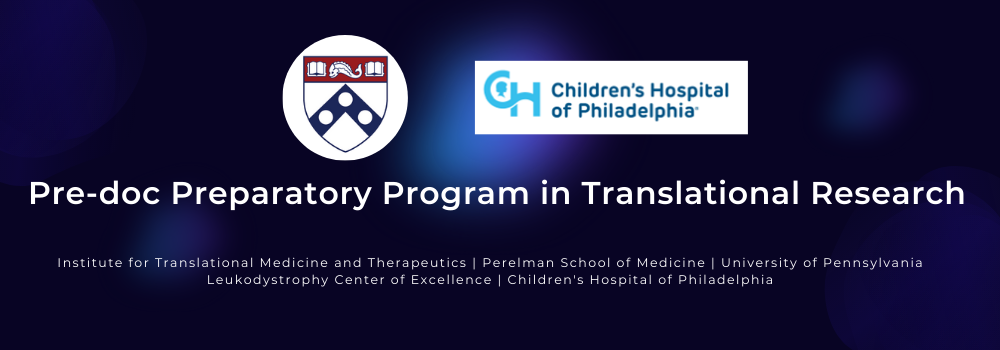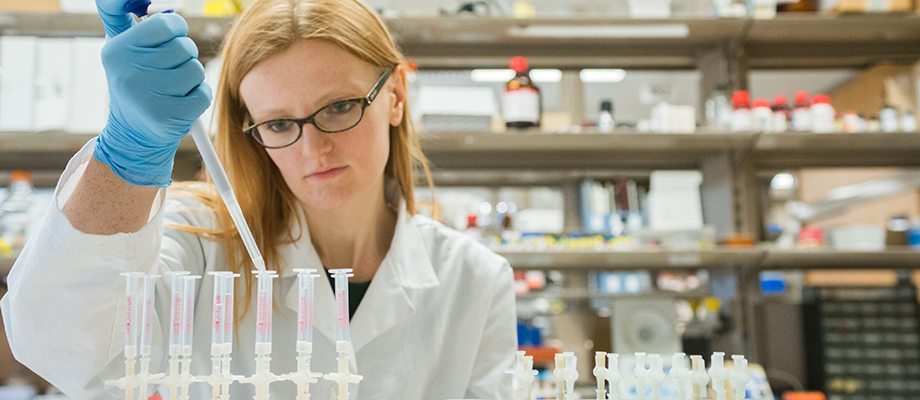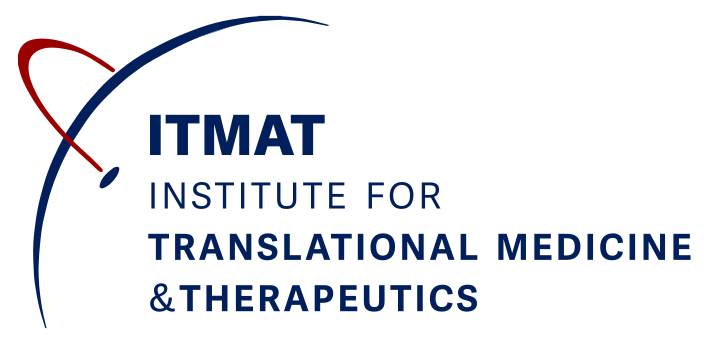Undergraduate Programs
Undergraduate Translational Research Immersion Program (TRIP)

The Translational Research Immersion Program (TRIP) provides undergraduate students at participating institutions experiential learning opportunities in the field of clinical and translational research (CTR). Partnering institutions include Bryn Mawr College, Haverford College, Howard University, Florida A&M University, Franklin & Marshall College, Lincoln University, Morehouse College, Spelman College, Swarthmore College, University of Pennsylvania, University of Puerto Rico, and Xavier University of Louisiana. The program is sponsored by the NIH Clinical and Translational Sciences Award (CTSA) and ITMAT.
This program includes a 10-week mentored summer research experience with the potential for extended year-round research opportunities that can occur remotely or in person. The 10-week mentored summer research experience starts May 23, 2023 and ends July 28, 2023. The program provides on-campus housing, a transportation allowance, and a stipend of $5,000.
Beyond the 10 weeks, students will have access to:
- A year-round virtual Translational Research Seminar Series
- Dual mentorship opportunities
- Community building activities with predoctoral and postdoctoral students at Penn
The additional components of this program will create an opportunity for undergraduates to engage in CTR beyond the 10 weeks and throughout their remaining undergraduate years.
What is Translational Research?
Translational research refers to the attainment and transfer of new knowledge from the bench to the clinic — and from the clinic to the bench. For example, basic scientists collaborate with clinicians to create new tools for the diagnosis and treatment of patients and for assessment of impact. Translational research is viewed as a medium for discoveries to be translated into practical diagnostic and therapeutic applications.
Mentored 10-week Summer Research Experience
Overview
This 10-week summer research experience includes substantial mentorship in clinical and translational approaches to understanding a disease and developing effective therapeutic modalities. The mentored summer research experience includes a didactic curriculum with research seminars, professional skills development workshops, student presentations, career panels, and social engagements. Students receive one-one-on advising from their mentor(s) and ITMAT Ed Leadership. Students are expected to work 40 hours per week in their mentors’ research lab and participate in the entire program experience.
Additionally, students interact regularly with the ITMAT Artist in Residence through the curriculum and other initiatives with the ultimate goal of translating science into communities.
Research Mentors
After acceptance into the program, students meet with their proposed research mentor to identify a good fit. Students are assigned research projects based on their area of interest. The research projects take many forms, with an emphasis on, for example, molecular biology, genetics, bioinformatics, or clinical interventions. The project may or may not involve work at the bench; however, it is usually linked to an established project and requires close interactions with personnel within the mentor’s lab.
Curriculum
Each week the students dedicate several hours to participating in TRIP curriculum that highlights methodologies in translational research, professional skills development workshops, career panels, student presentations where they share their research in progress, and social engagement. Students are encouraged to attend admissions info sessions offered by Penn graduate education programs. The 10-week summer research experience culminates with a final symposium which involves each student presenting their project in terms of hypothesis, data collection, analysis, etc., and placement of the work within the larger context of CTS efforts. Their research mentors, members of their lab, and faculty from their home institutions are encouraged to attend their final presentation.
In 2020, TRIP was highlighted in Penn Today for successfully transitioning to a virtual environment during the pandemic. Read more here.
Eligibility Criteria
- Currently attend a partnering institution
- Completed one year of college; preference will be given to students finishing freshman or sophomore years
- Demonstrate an interest and potential to pursue a career in the clinical or translational sciences
- Commit to attending and participating in the immersion experience
- The program is open to U.S. Citizens and Permanent Residents only
Application Instructions
Application Instructions
The Summer 2023 application is due Friday, February 3rd.
The Online Application requires the following materials:
- Resume
- Unofficial copy of transcript
- Statement of personal interests and goals – see below
- Two letters of recommendation using the template below- see below
Applications received after the deadline or incomplete applications will not be considered.
Statement of personal interests and goals
We’d like to know more about you and why you’re applying to this program. Please answer the following three questions in your personal statement. The personal statement should not exceed 1 page.
- Your reason(s) for doing the program, with specifics about what you hope to study. If you have a specific mentor you wish to be paired with indicate here.
- An explanation of your long-term goals, how the program fits into them, and why the program will be helpful to you.
- A discussion about how your academic coursework, research, and other relevant activities make you a good fit for this program.
Letters of recommendation
Two individuals familiar with your academic capabilities and potential for work in a biomedical setting should complete the letter of recommendation template and upload the letter to the application system. You will have the ability to send the link within the system. Please send a link to the recommender with enough time for them to submit their recommendation before the deadline. If you want, you can log in and send them the link before you submit your application.
To submit an online application, you will need to create a CollegeNet account and follow the steps below
- Create a CollegeNet account. After logging into CollegeNet, select “Online Application”.
- Enter your Personal Information. Save and continue to Program Information.
- Choose “Perelman School of Medicine – Masters and Certificate Programs”
- Select: “ITMAT Translational Research Immersion Program (TRIP)”
- Select “Summer 2023” term
- You can enter information in stages, at your own pace, and access the application any number of times until submission.
- Once the application has been fully submitted, check the status of the submission.
Acceptance into the Program
The application will close Friday, February 3, 2023. Applications will be evaluated by ITMAT Ed Leadership in consultation with the relevant undergraduate institution. Applicants will be notified by early March regarding the selection committee’s decision.
We anticipate 1-2 students per institution for Summer 2023.
Frequently Asked Questions
Application Process
- I am interested in applying for TRIP, but I do not attend a partner institution.
- Applicants must be from a partner institution to apply to the program.
- Is there an online application for TRIP?
- Yes, view the application requirements and link to apply here.
- I recently graduated, am I eligible to apply?
- Applicants must be enrolled in an undergraduate program at a partnering institution.
- I am an international student, am I eligible to apply?
- The program is open to US Citizens and Permanent Residents only. We cannot accept applications from international students who do not meet residency requirements at this time.
- I do not currently have a research mentor; will this be a problem for my application?
- Not a problem. In your application, you can indicate your areas of interest. If there are research mentors, you’re interested in working with at Penn you can also indicate them here.
- Do the letters of recommendation need to come from a professor?
- The recommender should be able to speak to your academic abilities and potential for work in a biomedical setting. Recommenders have included high school teachers, undergraduate professors, part-time job supervisors, summer internship research mentors.
- How many letters of recommendation do we need?
- Two letters of recommendation are required. Recommenders are welcome to write a formal 1-page letter or use the letter of recommendation template provided on the website.
- When do applicants receive decisions by the program?
- Applicants will be notified in March of each year regarding the selection committee’s decision.
Residential Housing Information
- Is housing provided?
- All summer participants will be provided on campus residential housing.
- If students need accommodations that differ from the standard room, please contact us to learn more. Students will be responsible for additional associated charges.
- Each residence hall is open 24/7 and the front desk will always be staffed with students and allied security will be present in the lobby around the clock to assist with additional building security.
- All summer participants will be provided on campus residential housing.
- Are we expected to share a dorm room with other participants?
- Almost all participants will have a single room with shared living space. However, it is important to note it is dependent on availability each year.
- Are the dorms furnished?
- The dorms are furnished with an extra-long twin bed, a dresser, a desk, and a desk chair. The living area (if applicable) in your units will include a sofa, table, and chairs. You’d be responsible for bringing your own linens.
- Do the dorms have kitchens?
- It is likely you’ll be assigned to a unit with a kitchen however it is not guaranteed. Kitchens have a full-size refrigerator, stove, oven, and sink. Kitchens do not come with a microwave, pots and pans, or cutlery.
- Are laundry rooms located in the residence halls?
- There are free laundry rooms on select even numbered floors.
- Is Wi-Fi available in the residence halls?
- Wi-Fi is available for all participants staying in the residence halls. You’ll receive more information in your welcome letter and upon check-in.
- Is there a checklist for items to bring to the dorm?
- We recommend you bring your own bed sheets, pillows, blankets, and towels as these are not provided. In addition, you should bring toiletries and cleaning products. Additionally, we suggest packing hangers, charging cords, and laundry detergent.
- Do I need to take public transportation to get from the dorms to campus/lab?
- The dorms are located on campus so you can easily walk.
- When is move-in / move-out?
- Typically, students can move in 1-2 days before the program begins. For move-out, students can move-out the day the program ends or the next morning. Timing for both will be provided in the welcome letter by Hospitality Services.
- Is it possible to move-in earlier than scheduled and/or stay beyond the 10 weeks?
- Unfortunately, it is unlikely to move in earlier and/or stay later. We recommend asking Hospitality Services if there are rooms available.
- Can I store my belongings on campus until we’re able to move in?
- Students are welcome to look into storage options but we are unable to store belongings.
- Are meal plans provided?
- No, meal plans are not provided by the program. However, you are welcome to purchase a meal plan at your own expense through Hospitality Services. Hospitality services will send you a registration link where you can make a credit card payment for the meal plan of your choice. Once they receive confirmation of the plan you’d like to enroll in, they’ll load the plan onto your PennCard and bill appropriately.
- If you purchase a meal plan, meal visits will be in one of Penn’s all-you-care-to-eat dining halls. Each time you eat, one visit is subtracted from your allowance. Dining Dollars can be used in any Penn Dining or Penn Dining Retail location. Each purchase amount is subtracted from your Dining Dollars account balance.
- The Flex 25: $395 (summer 2023)
- 25 meal visits
- $100 dining dollar
- The Flex 45: $595 (summer 2023)
- 45 meal visits
- $100 dining dollar
- The Flex 25: $395 (summer 2023)
Onboarding Process
- How many hours are we expected to work each week?
- Students are expected to engage in a full-time program, 40 hours per week. This would include receiving substantial mentorship and attending all programmatic elements.
- How do I receive my stipend?
- Students should have received a message from the ITMAT Business Office asking you to create a Penn Supplier account to receive the funds. If you did not, please contact us and we’ll connect you with someone in the business office.
- I’m interested in learning more about the stipends. When do we receive our stipends?
- Stipends are being paid as a prize/award, which are subject to 30% federal withholding on the payment. Stipends are distributed at the end of June and end of July (payment is split in half). Students enrolled in the program will receive a 1099-MISC form (since it’s more than $600). We recommend you put money aside for the taxes.
- How are students matched to mentors?
- Students enrolled in the program will have an opportunity to describe their research interests and potential mentors with the Program Director. Lab placements are determined with consideration from the mentor and student’s interests.
- Do program participants have access to Student Health Services?
- Students can be seen for basic services which would be fee for services. SHS does not take outside insurance plans, which can be problematic. We recommend looking into an urgent care center in University City that takes your insurance.
Student Spotlights
Sarah Weinshel, 2020 Summer Participant, Swarthmore College
 About Me
About Me
I am a currently a senior Honors Biology major and Art History minor at Swarthmore College. I am broadly interested in research in cellular and molecular biology related to human health. After graduation, I am planning on doing research for a few years before pursuing a MD/PhD degree, with the ultimate goal of becoming a physician scientist leading a research laboratory. Outside of my research experience in the TRIP, I’ve conducted plant molecular genetics research at Swarthmore since my freshman year.
TRIP Experience:
In the TRIP, I researched the connection between cerebrospinal fluid biomarkers and progression to cognitive impairment in Parkinson’s Disease, specifically looking at whether biomarker cutoffs in Alzheimer’s Disease applied in Parkinson’s Disease. The series of talks in the internship was especially formative in shaping my current desire to pursue both medicine and research as I learned about different careers in translational research. As I hadn’t had a lot of previous exposure to medical and translational research, I appreciated hearing from physicians, researchers, and more in the internship.
Lab Experience:
I had a wonderful experience working with my mentor, Dr. Sharon X. Xie, during the internship. We met basically daily over zoom and I was able to learn about the holistic process of biostatistics research from her, from conceptualization of an experiment to writing a paper. I also worked with Dr. Xie during the school year following my internship to finalize a manuscript on the research which is currently under review for publication.
Caelin Foley, 2022 Summer Participant, Bryn Mawr College
 About Me
About Me
I’m a sophomore at Bryn Mawr College intending to major in Biology and minor in Health Studies on the pre-med track. After graduation, I hope to attend an MD or MD/Ph.D. program and eventually, become a doctor.
TRIP Experience: TRIP was the first in-person summer research experience I’ve been able to participate in, and it was absolutely amazing. I developed strong relationships with my cohort, many of whom I still talk to after the program, and was able to network with researchers, doctors, and more to develop an understanding of my career goals and path. It helped to develop my confidence both in and out of the lab, and I am very grateful for this opportunity.
Lab Experience: I worked with Dr. Michele Lambert and Dr. Paul Gallo, both who work in hematology-oncology at the Children’s Hospital of Philadelphia. This summer, I studied how cytokines, an immunoregulatory protein, can be used to make diagnoses and treatment plans in pediatric patients. As we enter the fall semester, I am still actively engaged with my lab and working remotely to continue my project.
Harman Singh, 2022 Summer Participant, Franklin & Marshall College
 About Me
About Me
I’m a first-generation college student majoring in neuroscience at F&M. I’m currently a senior and I’ll be applying to medical school this upcoming cycle. My favorite breakfast food is a lox bagel.
TRIP Experience
TRIP was a wonderful experience for me. I enjoyed living in Philly while making new friends from all over the country, networking with leaders in the field, and identifying my own research interests.
Lab Experience
I worked at the Sleep Neurobiology and Psychopathology Lab this summer with Dr. Phil Gehrman and Dr. Arjun Sengupta. My lab was focused on clinical research, so I helped with patient recruitment, medical histories, and running experimental protocols for the clinical trials at the Penn Sleep Center. I was able to develop my own research project investigating the metabolomics of insomnia using multivariable analyses on polysomnography and metabolic patient data. We are currently finishing up our analyses and hoping to write a manuscript for publication in the upcoming year.
Sarina Smith, 2022 Summer Participant, Haverford College
 About Me
About Me
I am a senior Biology major and Health Studies minor at Haverford College working in Dr. Robert Fairman’s lab for my senior thesis. After graduating, I plan to take a gap year in which I will gain additional research experience and apply to Ph.D. programs. I am interested in neuroscience research, particularly the cellular and molecular bases of neurodegenerative diseases. A fun fact about me is that I really love the outdoors, and I think the effect of nature on our brains is fascinating.
TRIP Experience:
Participating in the TRIP program solidified my passion for translational research. I really value the process of moving findings from the lab into the clinic (and vice versa) and being able to see this process in action over this past summer was a really wonderful experience. I am grateful that I was able to meet so many other students passionate about science and medicine through this program. I also appreciate having the opportunity to connect with and learn from various researchers and clinicians at UPenn and CHOP.
Lab Experience:
During the TRIP Program, I worked in Dr. Elizabeth Bhoj’s lab, and I studied a rare, neurogenetic condition found in children called TBCK syndrome, which was first characterized by Dr. Bhoj and her colleagues at CHOP in 2016. TBCK syndrome has been shown to impact mTOR/AKT signaling and autophagy. For my project, my objective was to analyze the mTOR/AKT signaling responses of a TBCK knockdown HeLa cell model to determine if this model mimics what we observe in patient fibroblasts. I really enjoyed working in the Bhoj lab, and I am excited to continue collaborating with the Bhoj lab for my senior thesis project!
SeKai Parker, 2022 Summer Participant, Spelman College
 About Me
About Me
I am currently a sophomore majoring in health sciences/pre-med with a Spanish minor. I plan to attend medical school and become a dermatologist. A fun fact about me, I recently overcame my fear of dogs, and I am so excited to become a dog mom.
TRIP Experience:
I really enjoyed the TRIP summer program. I learned about myself as a learner and was able to build upon my lab skills. My mentor was incredible and having a one-on-one research experience allowed me to really blossom as a future researcher. My mentor allowed me to work in the lab but also shadow him in his rotations as a doctor at the Children’s Hospital of Philadelphia. I really got to experience the day-in-the-life of a real MD/PhD in Dr. Roizen.
Lab Experience:
Dr. Roizen welcomed me in his lab as an aspiring physician-scientist and heavily involved me with his day-to-day research and treatment of his patients. I felt like a genuine member of his team. What was very inspiring was that he allowed me to ask questions related to my interest especially as it related to race and health and helped me to have a much better understanding of this issue in health today. I also observed his superpower which was transformative – he was able to make kids feel safe and comfortable and their families feel like we were a team and all here to support and help heal their child. Dr. Roizen made me feel like pediatrics would be an awesome place for me as a future physician.
Catherine Chang, 2022 Summer Participant, University of Pennsylvania
 About Me
About Me
I am currently a senior at the University of Pennsylvania majoring in Biology and minoring in Chemistry, Neuroscience and Health Care Management from Taipei, Taiwan.
TRIP Experience:
TRIP was an amazing experience for me– I was able to meet such a wonderful cohort of people who shared the same passion and scientific interests as me. Everyone came from different places, and the lifetime connections I was able to make was so rewarding. I also really enjoyed all the speakers that make up an integral part of our curriculum. They were all super inspirational and allowed me to realize there are so many different careers in healthcare!
Lab Experience:
I worked in Dr. John T. Seykora’s laboratory learning about early detection for Squamous Cell Carcinoma in the Perelman School of Medicine’s Dermatology department. I worked directly under Dr. Matt L. Hedberg, who taught me a lot about DNA sequencing and creating a DNA construct that is used to create a transgenic mouse to help squamous cell carcinoma research. I was also able to attend many seminars hosted by Penn Dermatology’s ECuRE (Early Cutaneous Research Experience) program who supported summer trainees. At the end of the TRIP program, I was able to present my summer-long research results in our scientific symposium!
Jeanne Clery Disclosure of Campus Security Policy and Campus Crime Statistics Act
The federal Jeanne Clery Disclosure of Campus Security Policy and Campus Crime Statistics Act, as amended, requires colleges and universities to provide information related to security policies and procedures and specific statistics for criminal incidents, arrests, and disciplinary referrals to students and employees, and to make the information and statistics available to prospective students and employees upon request. The Campus SaVE Act of 2013 expanded these requirements to include information on and resources related to crimes of interpersonal violence, including dating violence, domestic violence, stalking and sexual assault. Federal law also requires institutions with on-campus housing to share an annual fire report with the campus community.
In addition, the Uniform Crime Reporting Act requires Pennsylvania colleges and universities to provide information related to security policies and procedures to students, employees and applicants; to provide certain crime statistics to students and employees; and to make those statistics available to applicants and prospective employees upon request.
To review the University’s most recent annual report containing this information, please visit: https://www.publicsafety.upenn.edu/clery/annual-security-fire-safety-report/ or http://www.upenn.edu/almanac/crimes-index.html.
You may request a paper copy of the report by calling the Office of the Vice President for Public Safety and Superintendent of Penn Police at 215-898-7515 or by emailing vp@publicsafety.upenn.edu
Non-discrimination Policy
The University of Pennsylvania values diversity and seeks talented students, faculty and staff from diverse backgrounds. The University of Pennsylvania does not discriminate on the basis of race, color, sex, sexual orientation, gender identity, religion, creed, national or ethnic origin, citizenship status, age, disability, veteran status or any other legally protected class status in the administration of its admissions, financial aid, educational or athletic programs, or other University-administered programs or in its employment practices.
Questions or complaints regarding this policy should be directed to the Executive Director of the Office of Affirmative Action and Equal Opportunity Programs, Franklin Building, Suite 421, 3451 Walnut Street, Philadelphia, PA 19104-6205; or (215) 898-6993.
Contact Us
For general questions related to the 10-week mentored summer research program, please contact:
Carsten Skarke, MD, Director of the ITMAT Undergraduate Program
Jessica German, MSEd, Associate Director of ITMAT Education
For general questions related to year-round research opportunities, please contact:
Jason Van Batavia, MD, MSTR, Faculty Lead
Jessica German, MSEd, Associate Director of ITMAT Education
Graduate Transition Programs
Pre-doc Preparatory Program (P3) in Translational Research

ITMAT Education (ITMAT Ed) at Penn and the Leukodystrophy Center of Excellence (LCE) at CHOP provides a one-year Pre-doc Preparatory Program (P3) in Translational Research to formalize the education and training of research coordinators working within the Global Leukodystrophy Initiative – Clinical Trials Network (GLIA-CTN). Research coordinators, referred to as P3 Scholars, are expected to be provided with 2 hours of protected time each week to pursue formal education in clinical and translational research. Most of the sessions will be held online via Zoom with opportunities to connect in person at special events. Funding by the GLIA-CTN consortium is provided to support program costs for participants, including travel awards to program meetings and events.
About the Program
This program lays the foundation for understanding practical aspects of designing and conducting clinical research in an academic environment. Scholars are introduced to clinical research, clinical protocols, study design and execution, ethical considerations in clinical research, study oversight, data management, the drug development process, and the regulatory environment. Scholars will build and practice professional skills throughout the academic year, attend rare disease research seminars and advocacy presentations, present their research in progress, and learn career pathways in research through career panels. P3 Scholars are introduced to these topics through asynchronous and synchronous learning environments. The content of the course includes seminars, case studies, scholar presentations, journal article-reviews, panel discussions, hands-on workshops, and scientific meetings.
Upon completion of the program, scholars will be able to:
- Assess the fundamentals of clinical and translational research, including the design and execution of standard operating procedures, experimental plans, and analysis
- Interpret ethical principles and the regulatory framework to the planning and execution of research as they relate to protocol privacy and confidentiality
- Apply resources, concepts, skills, and behaviors from professional development workshops to personal and professional goals
- Recognize the breadth of career opportunities in clinical and translational research to inform career goals
- Develop and present scientific research in progress to the academic community and beyond
Eligibility
Currently a research coordinator in the GLIA-CTN:
- Interested in growing a career in research and seeking professional development opportunities. The curriculum is targeting future leaders in translational research.
- Able to attend and participate in the program on Fridays from 11am to 1pm EST beginning October 2023 through May 2024 (please note, timing might shift for some in person events)
- Site PI approved conditions of enrollment
Application and Selection Process
Application Process
Research coordinators are encouraged to speak with their PIs about this opportunity to ensure protected time. Site PIs may nominate 1-2 participants by submitting a Scholar Nomination Form and Conditions of Enrollment. Nominations for 2023-2024 are open from May 22 -July 1. After the nomination is submitted by the PI, nominees must submit their application by July 15.
Site PIs should contact Dr. Laura Adang or Jessica German for the Scholar Nomination Form and Conditions of Enrollment.
Acceptance into the Program
Applications will be evaluated by P3 Leadership in consultation with the relevant consortium sites. Applicants will be notified by early August regarding the selection committee’s decision. We anticipate accepting 1-2 scholars per site.
Application
Application
The Online Application requires the following items:
- CV/Resume
- 1 page personal statement on interests and future career goals
Applicants, please add headers with your name to the applicable documents.
To submit an online application, you will need to create a CollegeNet account and follow the steps below
- Create a CollegeNet account. After logging into CollegeNet, select “Online Application”.
- Enter your Personal Information. Save and continue to Program Information.
- Choose “Perelman School of Medicine – Masters and Certificate Programs”
- Select: “ITMAT Pre-doc Preparatory Program in Translational Research, non-deg”
- Select “Fall 2023” term.
- You can enter information in stages, at your own pace, and access the application any number of times until submission.
- Once the application has been fully submitted, check the status of the submission.
Contact Us
For questions about the program, please contact:
Program Director: Laura Adang, MD, PhD, MSTR
Program Staff: Jessica German, MSEd
Non-discrimination Policy
The University of Pennsylvania values diversity and seeks talented students, faculty and staff from diverse backgrounds. The University of Pennsylvania does not discriminate on the basis of race, color, sex, sexual orientation, gender identity, religion, creed, national or ethnic origin, citizenship status, age, disability, veteran status or any other legally protected class status in the administration of its admissions, financial aid, educational or athletic programs, or other University-administered programs or in its employment practices.
Questions or complaints regarding this policy should be directed to the Executive Director of the Office of Affirmative Action and Equal Opportunity Programs, Franklin Building, Suite 421, 3451 Walnut Street, Philadelphia, PA 19104-6205; or (215) 898-6993.
Jeanne Clery Disclosure of Campus Security Policy and Campus Crime Statistics Act
The federal Jeanne Clery Disclosure of Campus Security Policy and Campus Crime Statistics Act, as amended, requires colleges and universities to provide information related to security policies and procedures and specific statistics for criminal incidents, arrests, and disciplinary referrals to students and employees, and to make the information and statistics available to prospective students and employees upon request. The Campus SaVE Act of 2013 expanded these requirements to include information on and resources related to crimes of interpersonal violence, including dating violence, domestic violence, stalking and sexual assault. Federal law also requires institutions with on-campus housing to share an annual fire report with the campus community.
In addition, the Uniform Crime Reporting Act requires Pennsylvania colleges and universities to provide information related to security policies and procedures to students, employees and applicants; to provide certain crime statistics to students and employees; and to make those statistics available to applicants and prospective employees upon request.
To review the University’s most recent annual report containing this information, please visit: https://www.publicsafety.upenn.edu/clery/annual-security-fire-safety-report/ or http://www.upenn.edu/almanac/crimes-index.html.
You may request a paper copy of the report by calling the Office of the Vice President for Public Safety and Superintendent of Penn Police at 215-898-7515 or by emailing vp@publicsafety.upenn.edu.
ITMAT MS1 Summer Internship

MS1 Research Internship Description
The Institute for Translational Medicine and Therapeutics (ITMAT) offers a seven week funded summer internship to first year Penn medical students interested in engaging in translational research. Interns are expected to attend departmental seminars and weekly lab meetings.. We will select 1-2 qualified candidates each year who will receive a $3360 stipend.
Application Instructions
Interested applicants should apply by Friday, February 3, 2023
The Online Application requires the following materials:
- CV
- Medical School Transcript (requested from the MD Registrar)
- One-page research proposal
- One letter of support from proposed mentor (submitted by the mentor via the online application system)
Applicants, please add headers with your name to the applicable documents.
To submit an online application, you will need to create a CollegeNet account and follow the steps below
- Create a CollegeNet account. After logging into CollegeNet, select “Online Application”.
- Enter your Personal Information. Save and continue to Program Information.
- Choose “Perelman School of Medicine – Masters and Certificate Programs”
- Select: “ITMAT MS1 Summer Internship”
- Select “Summer 2023” term
- You can enter information in stages, at your own pace, and access the application any number of times until submission.
- Once the application has been fully submitted, check the status of the submission.
Applications received after the deadline or incomplete applications will not be considered.
Former Interns
Summer 2023
- Sneha (Sai) Mannam – Transcriptomic Characterization and Quantification of the Flow Diversion Microenvironment for Intracranial Aneurysms
- Justin Kennedy – Serum SNTF biomarker analysis in a swine model of concussion
Summer 2022
- Nicholas Han — Using JAK Inhibitors to Target Epigenetic Changes That Limit Efficacy of Anti-PD1 for Lung Cancer
- Emily Yu — Mechanisms of exosome-mediated immunosuppression in IDH-mutant gliomas
Summer 2021
- Sally Nijim — The Functional Significance of Missense HLA Class I Allele Mutations in Acquired Aplastic Anemia
- Pranav Rekapalli — Using Transcranial Magnetic Stimulation to Treat Aphasia
Summer 2019
- Taylor Daniel — Evaluation of orthologous Il-2/IL-2R beta system on CAR- T based therapy
Summer 2018
- Michelle Guo — Skeletal morbidity and body composition abnormalities in high-risk neuroblastoma survivors
- Megan Shannon — Enhancement of Long-term Hematopoietic Engraftment Following In Utero Transplantation with Glycogen-Synthase- Kinase-3 Inhibitor Infused Nanoparticles in the Canine Model
- Alexandra Sperry —In utero base editing of cardiovascular disease gene ANGPTL3
Summer 2017
- Joe Durgin — Immune Evasion in Glioblastoma – A Potential Co-opting of the Mechanism by which Cytotoxic T Cells Avoid Self-Killing
- Lauren Reed-Guy — Identification of CD32b Expression and CD32b-mediated Internalization of mAb in Multiple Myeloma
Student Spotlight

Name: Joseph Durgin, MD, MSTR
Current Position: Medicine Intern (UPMC) / Dermatology Resident (University of Michigan)
Why did you apply to the internship and how did it impact your education experience at Penn? During my first semester of medical school, I got involved in lab-based research in the Center for Cellular Immunotherapies. Through this experience I realized that I wanted my career to include a significant component of lab-based research directed toward unmet clinical needs. The ITMAT MS1 internship allowed me to work full time on a project that ultimately became a longitudinal research experience during medical school. I later completed the project as part of the MSTR program. In brief, this research was one of my most defining medical school experiences. It was both rewarding and challenging to take on significant research efforts in addition to the clinical training of medical school. The ITMAT Education and Training programs provided a framework and community to help meet the challenges of navigating this path. Going forward, I am exploring post-doctoral research training in addition to residency in dermatology. My experience in the summer internship and MSTR program has definitely opened doors to continue pursuing my interests as a physician scientist.
Jeanne Clery Disclosure of Campus Security Policy and Campus Crime Statistics Act
The federal Jeanne Clery Disclosure of Campus Security Policy and Campus Crime Statistics Act, as amended, requires colleges and universities to provide information related to security policies and procedures and specific statistics for criminal incidents, arrests, and disciplinary referrals to students and employees, and to make the information and statistics available to prospective students and employees upon request. The Campus SAVE Act of 2013 expanded these requirements to include information on and resources related to crimes of interpersonal violence, including dating violence, domestic violence, stalking and sexual assault. Federal law also requires institutions with on-campus housing to share an annual fire report with the campus community.
In addition, the Uniform Crime Reporting Act requires Pennsylvania colleges and universities to provide information related to security policies and procedures to students, employees and applicants; to provide certain crime statistics to students and employees; and to make those statistics available to applicants and prospective employees upon request.
To review the University’s most recent annual report containing this information, please visit: https://www.publicsafety.upenn.edu/clery/annual-security-fire-safety-report/ or http://www.upenn.edu/almanac/crimes-index.html.
You may request a paper copy of the report by calling the Office of the Vice President for Public Safety and Superintendent of Penn Police at 215-898-7515 or by emailing vp@publicsafety.upenn.edu
Non-discrimination Policy
The University of Pennsylvania values diversity and seeks talented students, faculty and staff from diverse backgrounds. The University of Pennsylvania does not discriminate on the basis of race, color, sex, sexual orientation, gender identity, religion, creed, national or ethnic origin, citizenship status, age, disability, veteran status or any other legally protected class status in the administration of its admissions, financial aid, educational or athletic programs, or other University-administered programs or in its employment practices.
Questions or complaints regarding this policy should be directed to the Executive Director of the Office of Affirmative Action and Equal Opportunity Programs, Franklin Building, Suite 421, 3451 Walnut Street, Philadelphia, PA 19104-6205; or (215) 898-6993.
Contact Us
If you have questions about the internship, please contact us:
Marina Cuchel, MD, PhD | CTR Program Director | mcuchel@pennmedicine.upenn.edu
Jessica German, MSEd | ITMAT Ed Associate Director | jbgerman@upenn.edu

